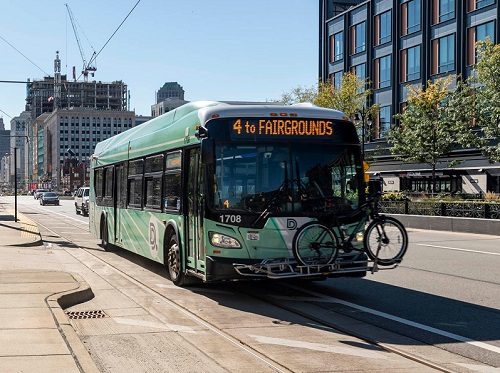The Michigan Department of Transportation is making it easier for Michigan residents to catch a ride on a bus, rideshare, bicycle, or scooter through its Michigan Mobility Wallet Challenge, a pilot grant program to open up transit options to everyone.
[Above photo by Michigan DOT]
The goal of the program is to make transit services more affordable and simpler for all citizens, including the disabled, poor, veterans and seniors. The idea of the “mobility wallet” is to create an app or smart card that can be used for multiple transit options in a community.
On a recent episode of its podcast series “Talking Michigan Transportation,” the Michigan DOT highlighted one of its non-profit grant recipients, Feonix–Mobility Rising.
Feonix developed a mobility wallet to allow veterans in the Detroit, Grand Rapids, Jackson, and surrounding areas greater access to transit services. The organization added that it plans to expand the program by January 2024 to include individuals and families experiencing poverty.
Feonix CEO Valerie Lefler explained how the company’s program works by using the example of a veteran who has cancer and no nearby family to drive him to his chemotherapy and radiation treatments. The veteran can use the mobility wallet to take the bus until he needs more assistance. The wallet then can be used for an Uber or taxi or an Americans with Disabilities Act or ADA-compliant paratransit vehicle.
Lefler cited a 2018 Veterans Administration study concerning the challenges veterans have in securing adequate transportation. One veteran in that study talked about why his war-induced post-traumatic stress disorder or PTSD prevented him from taking a bus to his medical appointments because of the shaking and jostling.
“If we can spend $30 million to equip him with gear and ammunition and all the things that they need in warfare, why can we not give these men and women an Uber or a taxi or a service when they’re seeking treatment, trying to recover from those experiences?” Lefler said on the podcast.
Ecolane Inc., also received a grant to develop a multimodal mobile transit application and smart card that uses Zig, a sensory technology that allows users to pay without having the remove their smart phone or card from their wallet. The technology, demonstrated in this video, is fully compliant with the ADA. Ecolane’s app will be available for nine transit agencies in Michigan.
Michigan DOT Director Brad Wieferich said in a news release that the mobility wallet program demonstrates that “Michigan is on the forefront of innovations in developing new technologies for public transit users.”

